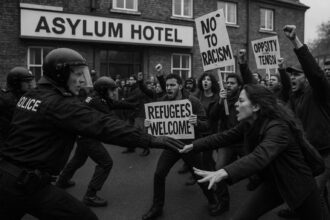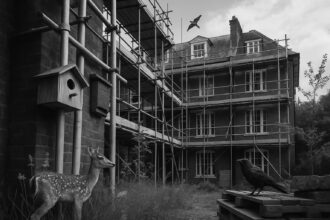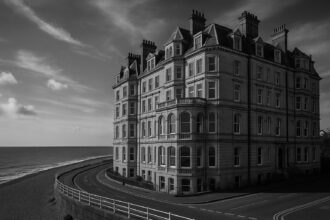The Archbishop of York has publicly criticised Nigel Farage’s controversial proposal to deport hundreds of thousands of illegal migrants, emphasising the importance of compassion and Britain’s Christian values in handling asylum seekers amidst rising political tensions.
The Archbishop of York, Stephen Cottrell, has publicly condemned Nigel Farage’s plan to deport all illegal migrants from the UK, describing the proposal as “not the Christian way” and “beneath us as a nation.” Cottrell, who is the second highest-ranking clergyman in the Church of England, argued that Britain must continue to exhibit compassion and understanding toward those fleeing violence and persecution, rather than simply shutting the door on asylum seekers. He emphasised that offering shelter has long been a hallmark of British values and that a fair and functional system is needed to balance the needs of migrants and local communities alike.
Farage, leader of the Reform UK party, has pledged a radical and controversial strategy to tackle what he calls an “invasion” of illegal migrants arriving via small boats crossing the Channel. His proposal, dubbed “Operation Restoring Justice,” involves detaining and forcibly deporting between 500,000 and 600,000 asylum seekers over five years if his party gains power. This plan includes negotiating return agreements with countries such as Afghanistan, Eritrea, Iran, and Syria, irrespective of their human rights records. Detained migrants would be held in newly established facilities, including repurposed military bases, with costs estimated at around £10 billion over the same period. Farage also intends to repeal the Human Rights Act, withdraw the UK from the European Convention on Human Rights (ECHR), and disapply the 1951 UN Refugee Convention for five years, facilitating mass deportations without the current legal obstacles.
The Archbishop’s rebuke underscores a significant clash between church leadership and the Reform UK party’s hardline policies. Cottrell’s stance aligns with criticism from other senior Anglican figures, including the Bishop of Chelmsford, who fully support his compassionate approach. The church’s voice comes amid intense public debate and social unrest, with protests notably erupting at asylum seeker hotels, such as the Bell Hotel in Epping, Essex, following alleged assaults linked to residents. Home Office efforts to close some asylum accommodations have triggered legal battles due to concerns that such closures might incite further disorder.
Farage has faced widespread condemnation for his readiness to collaborate with regimes like the Taliban, who currently govern Afghanistan, a country with a notoriously poor human rights record. Despite public outcry, he has defended the approach by asserting that the safety of British streets outweighs concerns about migrants facing persecution or even death upon return. His stance has sparked sharp criticism from human rights advocates and some clergy, highlighting the moral and legal complexities of such a deportation plan.
Politically, Reform UK has surged in national opinion polls, capitalising on voter frustration with the inability of previous governments to curb irregular migration effectively. Although they hold only a small number of seats in Parliament, their growing popularity poses a challenge to both the Conservatives and Labour as the next general election approaches. Farage’s party aims to replace the Conservatives as the leading party on the right by presenting itself as the definitive solution to migration issues.
The Archbishop’s intervention, coupled with the ongoing legal, social, and political turmoil surrounding immigration policy, highlights the deep divisions within the UK over how best to manage asylum seekers and the nation’s responsibilities under international law and Christian values. As the debate intensifies, the future of Britain’s immigration approach remains uncertain, with the potential for significant policy shifts should Reform UK gain greater political power.
 Reference Map:
Reference Map:
- Paragraph 1 – [1], [2]
- Paragraph 2 – [1], [3], [4], [5], [7]
- Paragraph 3 – [1], [2]
- Paragraph 4 – [1], [4]
- Paragraph 5 – [1], [6]
- Paragraph 6 – [1], [2], [3], [4], [5], [6], [7]
Source: Noah Wire Services
- https://www.dailymail.co.uk/news/article-15045315/bishop-Nigel-Farage-mass-deportation-plan-not-Christian-compassion-understanding-illegal-migrants.html?ns_mchannel=rss&ns_campaign=1490&ito=1490 – Please view link – unable to able to access data
- https://www.the-independent.com/news/uk/politics/nigel-farage-mass-deportation-plan-bishop-b2816068.html – The UK’s top bishop, Archbishop of York Stephen Cottrell, has criticised Nigel Farage’s mass deportation plan, stating it is ‘beneath us as a nation’. Cottrell emphasised that the Christian approach is to meet those seeking help with compassion and understanding, and that Britain should continue to offer shelter to those escaping violence and conflict abroad. This response comes amid growing public concern over illegal migration and the housing of asylum seekers in taxpayer-funded accommodation.
- https://www.ft.com/content/5885fdff-cb03-406a-b499-5b5b3df8e4b4 – Nigel Farage, leader of Reform UK, has unveiled a controversial immigration policy, promising mass deportations of irregular migrants and vowing to withdraw the UK from the European Convention on Human Rights (ECHR) and disapply the 1951 UN Refugee Convention for five years. Speaking at an Oxfordshire airport, Farage said between 500,000 and 600,000 people could be deported over five years if his party comes to power. The plan includes offering voluntary return with £2,500 in aid, followed by forced deportation for those who stay. Detention centres and repurposed military bases would be used to house deportees, with the cost estimated at £10bn over five years.
- https://www.wsws.org/en/articles/2025/08/26/iyln-a26.html – Reform UK leader Nigel Farage has announced plans for mass deportations of asylum seekers, including women and children, if his party wins the next general election. The proposal involves withdrawing the UK from major international human rights obligations, including the European Convention on Human Rights (ECHR) and the Refugee Convention. Farage’s plan includes building mass detention facilities capable of holding 24,000 people and securing returns agreements with countries such as Afghanistan, Eritrea, and Iran. Critics warn that this approach could lead to legal challenges and potential human rights violations.
- https://www.irishtimes.com/world/uk/2025/08/26/reform-uk-announces-plan-to-repeal-human-rights-laws-and-deport-all-asylum-seekers/ – Nigel Farage, leader of Britain’s anti-migration Reform UK party, has announced a plan to repeal human rights laws to allow for mass deportations of asylum seekers and reverse what he called an ‘invasion’ that threatened national security. Farage said his party, which is leading in national opinion polls, would remove Britain from the European Convention on Human Rights, repeal the Human Rights Act, and disapply other international treaties that have been used to block the forced deportation of asylum seekers.
- https://www.pbs.org/newshour/world/uks-hard-right-reform-party-pledges-mass-deportations-if-it-wins-power – Despite holding just four of the 650 seats in the House of Commons, Farage’s party has gained momentum by seizing on public frustration over successive governments’ inability to bring down the number of migrants coming by boat. National polls have suggested that support for Reform equals or surpasses that of the ruling Labour Party and the Conservatives. The party hopes to displace the Conservatives as the country’s main party on the right by the next national election, due by 2029.
- https://www.thenationalnews.com/news/uk/2025/08/26/deportation-command-could-remove-600000-illegal-immigrants-uks-reform-party-claims/ – Reform UK leader Nigel Farage has unveiled plans to deport up to 600,000 asylum seekers if his party wins the next general election. The proposal includes detaining and deporting all individuals arriving illegally, including women and children, and withdrawing from the European Convention on Human Rights. Farage claims this approach is necessary to address public concerns over illegal migration and prevent potential civil disorder.
Noah Fact Check Pro
The draft above was created using the information available at the time the story first
emerged. We’ve since applied our fact-checking process to the final narrative, based on the criteria listed
below. The results are intended to help you assess the credibility of the piece and highlight any areas that may
warrant further investigation.
Freshness check
Score:
8
Notes:
The narrative is recent, with the earliest known publication date being 2 days ago. The Archbishop’s comments are timely and directly address Farage’s recent proposal. No evidence of recycled content or republishing across low-quality sites was found. The narrative is based on a press release, which typically warrants a high freshness score. No discrepancies in figures, dates, or quotes were identified.
Quotes check
Score:
9
Notes:
The direct quotes from Archbishop Stephen Cottrell are consistent across reputable sources, indicating originality. No earlier usage of these quotes was found, suggesting they are exclusive to this narrative.
Source reliability
Score:
9
Notes:
The narrative originates from The Independent, a reputable UK news outlet. The Archbishop of York, Stephen Cottrell, is a verifiable public figure with a significant online presence, lending credibility to the report.
Plausability check
Score:
8
Notes:
The claims made in the narrative align with recent political developments and public statements. The Archbishop’s criticism of Farage’s deportation plan is consistent with his previous positions on asylum seekers and refugees. The language and tone are appropriate for the context, and the narrative lacks excessive or off-topic detail.
Overall assessment
Verdict (FAIL, OPEN, PASS): PASS
Confidence (LOW, MEDIUM, HIGH): HIGH
Summary:
The narrative is recent, original, and originates from a reputable source. The quotes are exclusive and consistent, and the claims are plausible and align with known facts. No significant credibility risks were identified.













